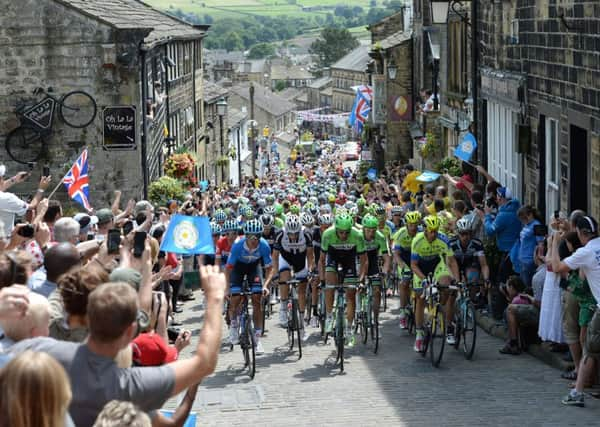Andrew Vine: Stars welcome but humble cyclist still riding for a fall


Even with a full set of lights on the bike, front and back, and a high-vis jacket, the dark mornings and early dusk are testing times to be on the road.
Drivers still groggy from bed or worn out after a day at work and a crawling commute home through the rain often shave that bit too close for comfort as they pass.
Advertisement
Hide AdAdvertisement
Hide AdI’ve long believed that in order to drive a car safely when sharing the road with cyclists, those behind the wheel should have tried their luck on a bike.
It would give them a whole new perspective on road safety, and maybe even a eureka moment of revelation not just about how much space cyclists need, but also about passing in such a way that doesn’t leave their hearts pounding like a trip-hammer.
I’m not a fan of cyclists taking to the pavements, being old enough to have had it drilled in as a child that it was against the law, but I can understand why it happens. Better to endure the ire of pedestrians and get home in one piece than engage in a losing battle for road space.
And that’s a battle that ought to be taken out of the hands of individual cyclists and drivers who wage it on roads every day.
Advertisement
Hide AdAdvertisement
Hide AdThere needs to be a complete rethink of the way motorists and cyclists share the roads, a cultural shift that respects the safety and convenience of both, especially now that Britain in general, and Yorkshire in particular, is becoming the world’s spiritual home of cycling.
From racers with state-of-the-art machines to the potterers to the shops with a basket mounted in front of the handlebars, we’re turning into a nation of cyclists in a way that hasn’t been seen since entire factory workforces went to work on bikes and car ownership was far less widespread.
The proof of that was to be seen in the pride Britain took in its incomparable and unbeatable cyclists at the Olympics and Paralympics, which made for such a glorious sporting summer.
That pride in and enthusiasm for cycling was underlined by last week’s coup of Yorkshire winning the right to host the 2019 Road World Championships, an eight-day extravaganza that will expose our county to a massive worldwide television audience.
Advertisement
Hide AdAdvertisement
Hide AdJust as with Yorkshire’s spectacularly successful staging of the Tour de France’s Grand Départ two years ago, there is every likelihood that such exposure will bring a significant economic boost and long-term benefits for our tourism industry.
But equally important, the championships set the seal on Yorkshire as the world capital of cycling, and the ideal place to continue building a legacy that reaches far beyond the ranks of the star athletes who will be competing.
That legacy is to promote and encourage mass participation in cycling. It is not just about racing, but about getting people on their bikes for the sake of their health and enjoyment, as well as for the benefit of the environment.
But if that is to happen, there needs to be a step change in the country’s attitude towards cycling and a rebalancing of the relationship between people on bikes and in vehicles.
Advertisement
Hide AdAdvertisement
Hide AdEvery time I get on my bike, my principal concern is for my safety in traffic. Every other cyclist I know feels the same.
We are all uncomfortably aware that through no fault of our own we could be involved in an accident and, however blameless, it will be us who come off worst if a driver is careless or makes a misjudgement.
That worry is the roadblock to cycling truly becoming a mass activity, something recognised by Britain’s Olympians when they wrote to the Prime Minister after the Rio games to request a huge expansion of the country’s network of cycle lanes.
Those Olympians, many of whom took part in yesterday’s homecoming parade in Manchester, knew perfectly well that cyclists like me would feel a whole lot safer, and be out on a bike even more often if there was less competition for road space.
Advertisement
Hide AdAdvertisement
Hide AdMaking the needs of cyclists a much higher priority in road planning – especially in urban areas – is one part of the answer, but another is education.
The number of vehicles on the road is only ever going to increase, so greater emphasis has to be put on teaching drivers how to co-habit amicably and safely with cyclists.
That’s an achievable aim. The Netherlands has managed it by making interaction with cyclists a central part of driver training. We would do well to follow its example.
Because building a legacy of cycling would be good for us all. There is joy, as well as good health, to be found on two wheels, and we can’t have enough of either.